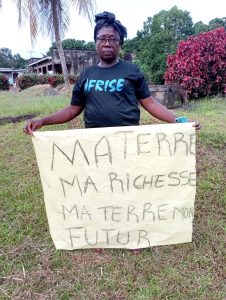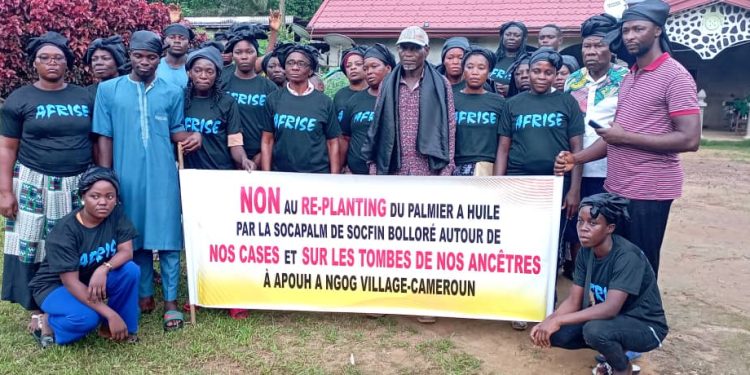Story, Louvier Kindo Tombe
The riparian community around the SOCAPALM plantation in Edea has suffered from the excesses of the oil palm company for over 40 years. Their farm lands and forest have been confiscated without compensation, and the activities of the agro-industry continue to polutte their rivers depriving them of their main sources of livelihood.
Recently, after a peaceful negotiation with authorities of the company, the women thought they would soon see the end of the tunnel.
Their hopes were dashed out on the 19th of March 2024, when the company notified them through their village chief, of a replanting programme, scheduled to start in April 2024.
The replanting activities of SOCAPALM’s plantation are the cause of most of the many problems faced by the community.
“The present replanting is a way of depriving us and our families of the basic living space on which we depend,” says Félicité NGON BISSOU, president of AFRISE.
Faced with this development, the women have addressed an open lettre to the management of SOCAPALM, in which they call on the company to postpone the programme and to honour an appointment he made with them, that of visiting the sites in question and personally resolve the misunderstanding.
The women in the open letter reminded authorities of SOCAPALM that the replanting is in violation of the terms of the long-term lease signed with the state of Cameroon, in particular article 6(h) on “the obligation of the transferee”.
“This prohibits any replanting on plots of land within an area of 250 ha around the village communities without the competent administration having first set aside any plots of land allocated as living space,” the women wrote in their letter.
The idea behind the open letter is to mitigate the consequences of the activities of SOCAPALM, and for peace to reign within the community. But for this to happen there must be a reasonable living space.
“We are now landless peasant women, and we have a responsibility to provide food for our families, the letter reads.
Community challenges

In this quest for justice, the women say “we suffer physical violence, sexual violence, sexual abuse, rape and arbitrary arrest on a daily basis”.
Deprived of the dignity stripped from them, the women are forced to compromise in order to survive with their families. Deprived of the freedom, They and their families are forbidden to move freely on their territory because of the multiple barriers SOCAPALM has erected and the 4x4m trenches the company has dug all around their huts.
They cannot carry out economic activities in such conditions, especially as SOCAPALM is systematically destroying their palm oil production units, even though they have the right to process the nuts from their village plantations.
“We have to travel miles by motorbike or on foot to find drinking water. When we fall ill, we are not even entitled to treatment by your health services, on the spurious grounds that we are not company employees. Our children are not allowed to attend the schools you have built, and they cannot find decent jobs in your company once they reach working age,” they wrote in the letter.
The women regret the fact that “SOCAPALM is supposed to be a development project, but we wonder for whom this development is intended? Where are the infrastructures that are supposed to enable the development of our community?”.
They question why they, the local women, are condemned to live in misery and fear.








